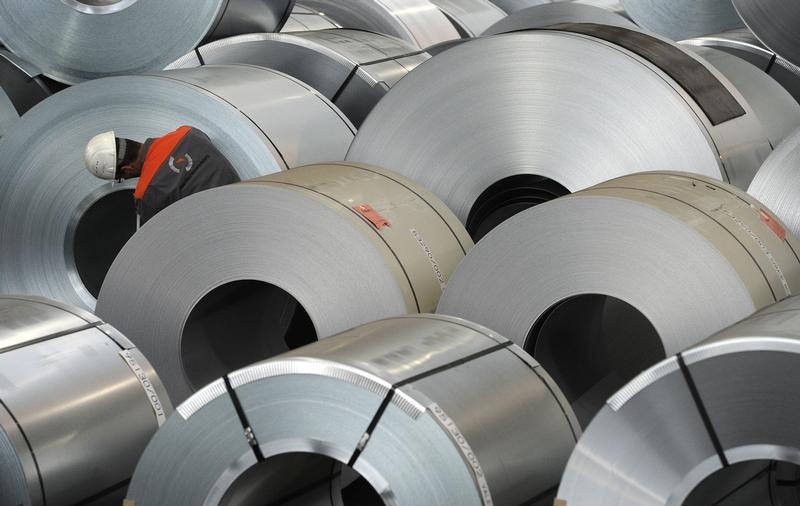* Sinosteel deferred interest payments
* China aims to reform SOEs by 2020
* China wants more market discipline in SOE sector
* SOE debt now stands at $11.3 trillion
By Ruby Lian and David Stanway
SHANGHAI, Oct 23 (Reuters) - The prospect of China's state-owned metals trader Sinosteel defaulting on its debt leaves Beijing with a dilemma: stick with its pledge to let market forces operate in its sprawling state sector or step in to save jobs and keep the steel giant afloat.
On Monday Sinosteel extended the date investors can start redeeming its bonds and also deferred interest payments, citing liquidity problems, fuelling concerns about the mounting default risks in China's bloated state-owned enterprises (SOEs). urn:newsml:reuters.com:*:nL3N12J1D3
Last month China promised to create "stronger, better and larger" SOEs through a far-reaching reform programme, which includes restructuring those that are performing poorly and allowing some to close. urn:newsml:reuters.com:*:nL4N11J07X
The programme is expected to take five years to implement, but the huge debts facing many of China's mammoth state-owned firms, which together employ around 7.5 million people, need more urgent attention.
Chinese media has reported Beijing is on the verge of intervening to save Sinosteel, a move some in the metals industry say would set the wrong precedent for other struggling SOEs.
"Sinosteel is a typical 'zombie enterprise'...the government should let the company go bust," said Xu Zhongbo, a steel industry veteran and president of Beijing Metal Consulting in Beijing.
Total debts at China's state-owned firms rose 11 percent from a year earlier to 71.76 trillion yuan ($11.29 trillion) in the first eight months of 2015, according to the latest Ministry of Finance data. Servicing those loans is getting costlier, with financing costs up 12.1 percent over the period.
Sinosteel's liabilities are estimated at more than 100 billion yuan, with a debt-to-asset ratio of 98 percent over the 2011-2013 period, according to a report issued last year by domestic credit rating agency China Cheng Xin.
Sinosteel's spokespeople could not be reached for comment to confirm those figures or comment on their current situation.
SOCIAL STABILITY FIRST
Several SOE executives believe China will have to pull back from its reform programme while companies grapple with the slowing economy, particularly in the commodities and shipbuildling sectors.
"The government will still want the market to allocate resources, but the government will have to put social stability first and consider bad loans for banks...so it won't just sit on the sidelines," Xu Lejiang, chairman of China's no.2 steel maker Baosteel, told reporters on Wednesday.
However, the government is also blamed by some in the industry for incentivising SOEs to grow too big in the first place.
Beijing Metal Consulting's Xu says Sinosteel's expansion over the past decade is emblematic of the path taken by many state firms.
"Aggressive acquisitions...big investment in overseas mining and fooling around with private mills all caused the firm to become what it is today," he said.
In 2004 Sinosteel's then-chairman, Huang Tianwen, embarked on a rapid expansion programme that extended the trader's business into sectors like fire resistant materials and machinery manufacturing.
In the run up to the global financial crisis, China encouraged state steel companies to invest heavily in mining projects in a bid to gain more control over global iron ore supplies, adding to their debt piles.
In June 2011, Sinosteel Midwest Corp, a unit of Sinosteel Corp, was forced to halt a $2 billion iron ore project in Australia, one of China's biggest overseas mining projects, due to uncertainty over port and rail construction development. It also shut its Blue Hills iron ore mine in Australia in April this year.
Huang was held responsible for the company's spiralling debts and dismissed in 2011. His successor Jia Baojun was replaced last year.
Now Beijing is trying to unravel more of the less efficient ventures undertaken by SOEs, and force some of the poorly performing ones to merge as part of its reform agenda.
But with the debts continuing to pile up, China faces an uphill task to achieve that before more companies are brought to the brink of default.
"I don't know how the government can push ahead with the SOE reform, it will be extremely difficult," said one senior executive with China's top aluminium producer Chinalco.
($1 = 6.3583 Chinese yuan)
(Editing by Rachel Armstrong)
